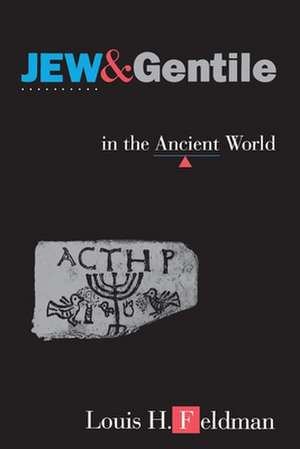Jew and Gentile in the Ancient World – Attitudes and Interactions from Alexander to Justinian
Autor Louis H. Feldmanen Limba Engleză Paperback – 27 noi 1996
Feldman draws on a wide variety of material, from Philo, Josephus, and other Graeco-Jewish writers through the Apocrypha, the Pseudepigrapha, the Church Councils, Church Fathers, and imperial decrees to Talmudic and Midrashic writings and inscriptions and papyri. What emerges is a rich description of a long era to which conceptions of Jewish history as uninterrupted weakness and suffering do not apply.
Preț: 462.38 lei
Preț vechi: 570.83 lei
-19% Nou
Puncte Express: 694
Preț estimativ în valută:
88.47€ • 92.64$ • 73.39£
88.47€ • 92.64$ • 73.39£
Carte tipărită la comandă
Livrare economică 09-23 aprilie
Preluare comenzi: 021 569.72.76
Specificații
ISBN-13: 9780691029276
ISBN-10: 069102927X
Pagini: 696
Dimensiuni: 155 x 228 x 40 mm
Greutate: 0.94 kg
Ediția:Revised
Editura: Princeton University Press
Locul publicării:Princeton, United States
ISBN-10: 069102927X
Pagini: 696
Dimensiuni: 155 x 228 x 40 mm
Greutate: 0.94 kg
Ediția:Revised
Editura: Princeton University Press
Locul publicării:Princeton, United States
Notă biografică
Descriere
Relations between Jews and non-Jews in the Hellenistic-Roman period were marked by suspicion and hate, maintain most studies of that topic. This book argues that if such conjectures are true, how did Jews succeed in winning so many adherents, whether full-fledged proselytes or 'sympathizers' who adopted one or more Jewish practices?
